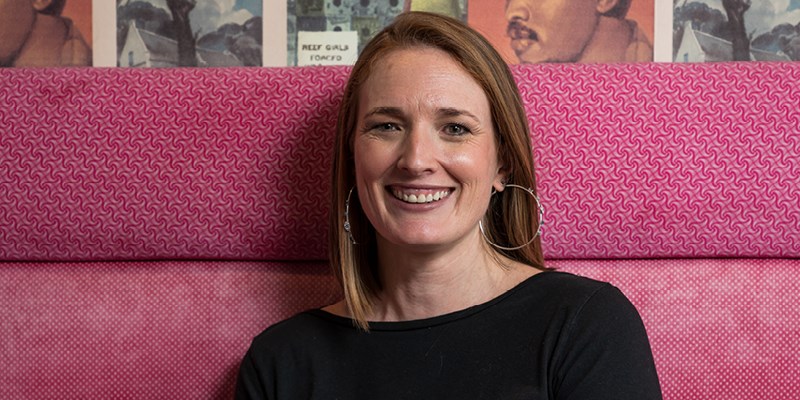This month, we’re bringing you up close and personal – well, more professional actually – with Google’s Lorraine Landon, who will be joining us on the panel at the Cookies, Cats, and a Light Sprinkling of POPIA event, which we are co-hosting with Novation in May. As specialist lead sub-Saharan Africa, Lorraine runs a team of digital specialists – the “Power Rangers” – who work together to formulate the best digital solutions based on their clients’ needs. To grow her clients’ specific digital maturity needs and help them navigate the always-changing digital world, Lorraine’s team focuses on digital maturity and marketing transformation, search, video, measurement, digital creative, digital UX, the Google marketing platform and analytical insight generation.
What does the future of digital advertising look like?
Lorraine: Digital advertising in the future will be defined by a mindfulness around data that has been cultivated in a shifting landscape. How data is collected and used will be the central theme of future-focused digital marketing. Catalysing this is the increased lack of trust from users, as well as a demand for greater privacy on the web. We have seen regulatory bodies responding to this by legislating transparency and controls for users and accountability from adtech.
The result of this is that there will be less user data that is used for marketing and measurement across the internet and our ways of deriving consumer insights will have to shift to accommodate this. Future-focused advertisers will be employing strategies for first-party data generation and usage, as opposed to a reliance on data generated from third parties. Technology will also have to play a significant role in terms of establishing privacy-first approaches such as automation, machine learning and APIs in digital measurement and insight generation.
Google has delayed the death of the third-party cookie to 2023. What advice would you give to marketers, considering how this move towards more transparent, privacy-first solutions will affect digital marketing?
Lorraine: Change is inevitable in the coming years. However, advertisers should still value the relevance of their advertising to their audiences while protecting user identity and information. This delay gives advertisers the opportunity to focus adequately on future-proofing their marketing measurement strategies.
Firstly, it is important for businesses to prepare for this great change to digital marketing approach. They should understand the users’ and legislators’ privacy expectations and see how that translates into their measurement and adtech infrastructure – e.g. first-party data strategy, tagging of digital properties, the use of comprehensive analytics.
It should also be understood that the collection of data is a value-exchange. Advertisers should communicate a clear value proposition to customers when requesting their data (e.g. loyalty programs, improved experiences, discounts).
Consumer insights are a driving force in business growth and development and it is necessary for advertisers to look at different ways of deriving insights even when less data is being collected. Here is where machine-learning technologies will really help to maximise the data they do have and achieve the desired results. Adopting a ‘test and learn’ strategy to determine the level of personalisation required in the digital marketing strategy is recommended.
It is also really important to remember that this is a new era for the internet and much of the future will be determined by conversations and feedback given by users and advertisers going forward. At Google, we are engaging major players in the Privacy Sandbox, where developments and discussions regularly occur. The goal here is to ensure that not only do we maintain relevance for those who engage with the digital space, but also build solutions that will be sustainable for years to come.
How important is first-party data for businesses – now and moving forward?
Lorraine: First-party data will become the most important element of any advertising exercise going forward. With third-party data being deprecated, advertisers will have to rely on the data they collect and manage. There are some major advantages to having a very robust first-party data strategy. First-party data provides richer signals that inform advertising algorithms for bid optimisations and automated targeting, often outperforming non-audience traffic and driving higher conversions.
The advantages of this are:
- Identification and retention of high-value clients
- Increased media efficiency – getting the right message to the right person, limiting wastage
- Machine learning can translate characteristics of the advertiser first-party base into finding similar audiences across the internet
- Generation of product innovation insights – understanding how customers use products and where their pain points may be
- Having deeper insights from your first-party data which gives a competitive advantage
What role do you see content marketing playing and should it be a focus for marketers?
Lorraine: The simple fact is that users come to the internet to consume content – it informs the user experience. Whether it is an interaction with an article, a video or a banner ad, the same principles should apply in terms of relevance and a value exchange between advertiser and consumer. When you are measuring what your consumers are spending their time reading and watching on the internet, this data should be used to inform how you use content to communicate with them ever more effectively. Users come for an experience and as marketers, you have an opportunity to positively contribute towards this experience through the creation of meaningful and useful content.
What is your favourite kind of (edible!) cookie?
Lorraine: Cookies are my weakness, so my love is far-reaching. However, my top contenders are: Lemon Creams, Zoo biscuits, snickerdoodles, peanut butter cookies and even… the humble Marie biscuit. All with a good cup of tea, of course!
Lorraine Landon is specialist lead sub-Saharan Africa at Google.


